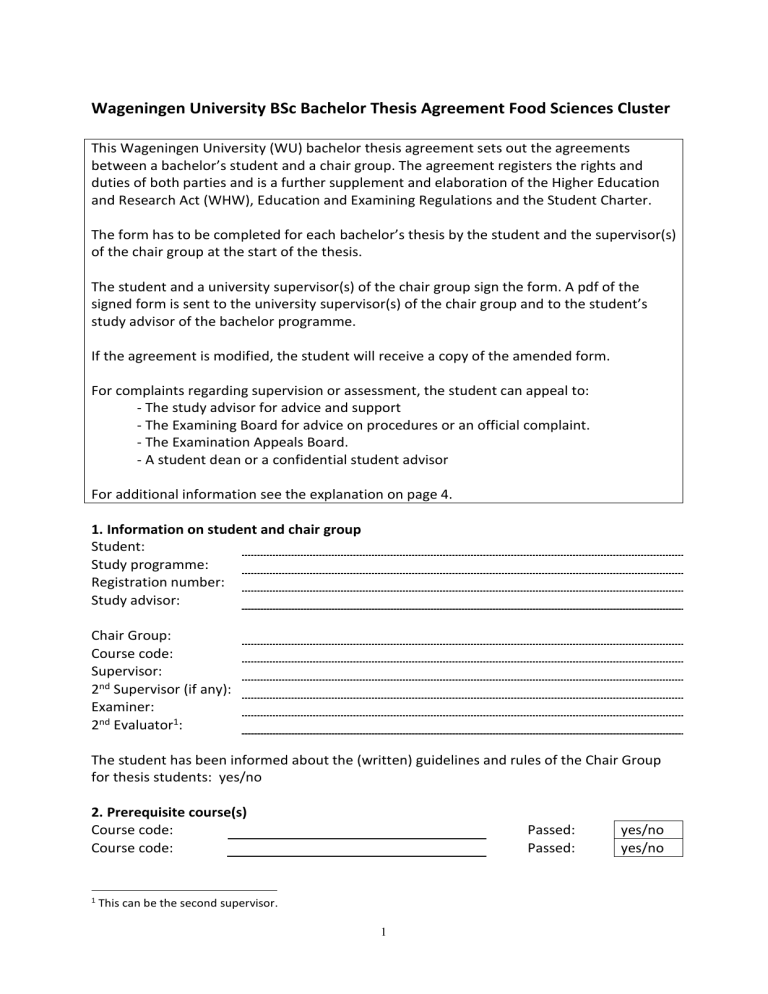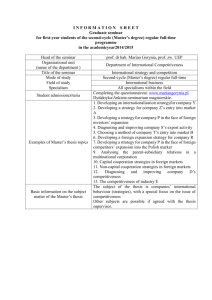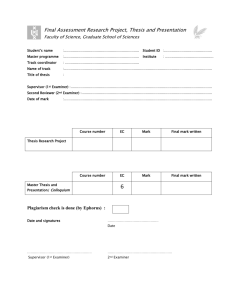BSc Bachelor Thesis Agreement 2015

Wageningen University BSc Bachelor Thesis Agreement Food Sciences Cluster
This Wageningen University (WU) bachelor thesis agreement sets out the agreements between a bachelor’s student and a chair group. The agreement registers the rights and duties of both parties and is a further supplement and elaboration of the Higher Education and Research Act (WHW), Education and Examining Regulations and the Student Charter.
The form has to be completed for each bachelor’s thesis by the student and the supervisor(s) of the chair group at the start of the thesis.
The student and a university supervisor(s) of the chair group sign the form. A pdf of the signed form is sent to the university supervisor(s) of the chair group and to the student’s study advisor of the bachelor programme.
If the agreement is modified, the student will receive a copy of the amended form.
For complaints regarding supervision or assessment, the student can appeal to:
- The study advisor for advice and support
- The Examining Board for advice on procedures or an official complaint.
- The Examination Appeals Board.
- A student dean or a confidential student advisor
For additional information see the explanation on page 4.
1. Information on student and chair group
Student:
Study programme:
Registration number:
Study advisor:
Chair Group:
Course code:
Supervisor:
2 nd Supervisor (if any):
Examiner:
2 nd Evaluator 1 :
The student has been informed about the (written) guidelines and rules of the Chair Group for thesis students: yes/no
2. Prerequisite course(s)
Course code:
Course code:
Passed:
Passed: yes/no yes/no
1 This can be the second supervisor.
1
3. Title and planning
Title of the thesis project:
Start date:
Expected completion date:
Special planning arrangements:
Nature of the activities
4. Arrangements regarding supervision
Planned
Weeks Credits
(Arrangements regarding the type and intensity of student and supervisor meetings and on roles and responsibilities if more supervisors or more chair groups are involved):
5. Arrangements regarding facilities
(Work place (office/lab), access to buildings and locations. Availability and use of equipment, materials and facilities):
2
6. Arrangements regarding report
(Language and lay out, time and format of transfer of results and data, agreements on secrecy of results, and publicity of the thesis report):
7. Arrangements for individual situations.
(Special/unforeseen circumstances, disability, absence for special reasons)
8. Assessment
The bachelor thesis evaluation form of the Food Science cluster has to be used (see page 6).
The weighting (%) for each part of the assessment:
Learning outcomes (assessment criteria) Percentage
A. Research competence
B. Thesis report
50%
30%
C. Colloquium
D. Examination
10%
10%
9. Signature
The student agrees to report any relevant changes in circumstances which may affect the results of the project to the supervisor.
The student declares that he/she is familiar with both the chair group and assessment form rules and procedures. The chair group declares that they have provided the student with all the relevant information (including rules, regulations, and safety issues).
Wageningen,
Name
Student:
Date Signature
Supervisor:
2 nd Supervisor:
Examiner:
2 nd Evaluator:
3
Explanation
1. Information for student and chair group
The study programme (study advisor) has to be informed about the arrangements a student wants to make for his/her thesis project in order to establish whether the programme permits the student to take this thesis, and to keep records of the student’s progress.
The examiner will be the chair holder responsible for the thesis. The supervisor is responsible for daily supervision. Supervisors from an external organisation can only have an advisory role in the grading process. If more supervisors and chair groups are involved, each role should be explained under item 5.
2. Prerequisites
Chairs may determine a maximum of two prerequisite courses (in total 12 credits) for starting a thesis. These prerequisites have to be published in the Study Handbook. The student has to pass the exam(s) before being granted access to the thesis.
3. Description and planning
In general, reference can be made to an existing chair group project proposal, including subject and type of activities. An important aspect is that the student has to write a detailed project description and is aware of all the consequences with respect to type of activities, intensity and planning of work. If the student intends to interrupt the project for exams or a period of leave/absence, this has to be agreed with the supervisor in advance.
4. Arrangements on supervision
Supervisors have their own guidelines for planning meetings with students and for involving co-workers. In cases where more supervisors and chair groups are involved, the student should not be confronted with conflicting rules and opinions: The supervisor of the group bearing the code of the thesis should be the focal point for the student. It is recommended to include an intermediate evaluation.
5. Arrangements on facilities
The chair group arranges the facilities required for the student. In general, it should be assumed that the student is unfamiliar with the policy concerning priorities for use of equipment and facilities, and is not aware who is in charge of them. The student needs to be informed that arrangements made are never a guarantee for availability, and that due to unpredictable circumstances the thesis project may have to be adapted with respect to time planning and/or content. The chair group and the student then have to agree solutions together.
6. Arrangements on report
Specific rules on the lay-out of a report, the transfer of data sets and processed results have to be agreed.
The thesis project may be part of a larger project in which external partners are involved, or in which results may be generated that require confidentially. The university has guidelines re protection and embargo of scientific results. Thesis reports can be registered with a restriction on disclosure of contents. The examiners and supervisor(s), however, always need a full copy to be able to assess the student.
4
From October 2009, theses have to be uploaded to the Wageningen UR Digital Library through the AIR (Administration Enrolment data and Results). It is up to the Chair Group and student to decide whether the thesis will be made public or not in the Digital Library.
7. Arrangement for individual situations
Students can ask for specific facilities for example in the case of disabilities. The student and
Chair Group can ask the study advisor or Dean for students for advice. Additional arrangements for Double Degree students can be included here if needed.
8. Assessment procedure
In 2006, the Examining Boards and Board of the Education Institute decided that all WU chair groups have to use the standard assessment form for theses and appoint the examiner and a second evaluator. During the examination the examiner (or his/her WU representative) and at least one other WU supervisor/evaluator must be present. Within the Food Science cluster, all chair groups are using the same weight (percentages) of the assessment criteria and the same criteria within an assessment cluster on the Excel-form. The student should be informed about this weighting (item 9 of this agreement).
5
Bachelor thesis evaluation Wageningen University - Food Science cluster
Name chair group
Name student
Registration number
Study programme
Specialisation
Code thesis
Short title thesis
Date examination
Supervisor chair group
B
1
2
3
Input Percentage per Chairgroup
100%
0%
0%
Signature pdf handed in
Extra supervisor or outside chair group
Examiner
NB. Items mentioned under Research competence and Thesis report are intertwined and should be regarded as belonging together.
Research competence
1 Commitment and perseverance
2 Initiative and creativity
3 Independence
Remarks
Includes amounts of work and results obtained
Includes problem solving ability
.
5 Handling supervisor's comments and accuracy in working, and quality of results (how, reliability)
Includes practical skill, social awareness (functioning in a
Grading Weighing mark 1-10 factor
15%
20%
15%
20%
20%
Relative weight
50%
0.0
.
6 Keeping to the time schedule skills (going from research question to research methods)
Includes organisation of the work and adaptation of plans 10%
Thesis report
1 Relevance research, clearness goals, delineation research
2 Theoretical underpinning, use of literature
3 Use of methods and data
4 Critical reflection on the research
Includes development of scientific understanding/insight, technological synthesis (implementation in technical
Includes innovation of methods
Includes critical attitude to literature and work of others, performed (discussion)
.
5 Clarity of conclusions and recommendations
6 Writing skills next to the same attitude to own methods and data. It also includes analytical skills ('what do the result imply?')
10%
35%
10%
35%
5%
5%
30%
0.0
.
Colloquium
1 Graphical presentation Use of means other than verbal expression
2 Verbal presentation and defence Includes focus on main theme (take-home message), interaction with audience, structure and conclusion
Examination
1 Defence of the thesis
2 Knowledge of study domain
TOTAL
30%
70%
10%
0.0
50%
50%
10%
0.0
!! NOT YET ALL GRADES ENTERED !!
0.0
FINAL GRADE
Comment by supervisor
Comment by 2nd reviewer/examiner
6








